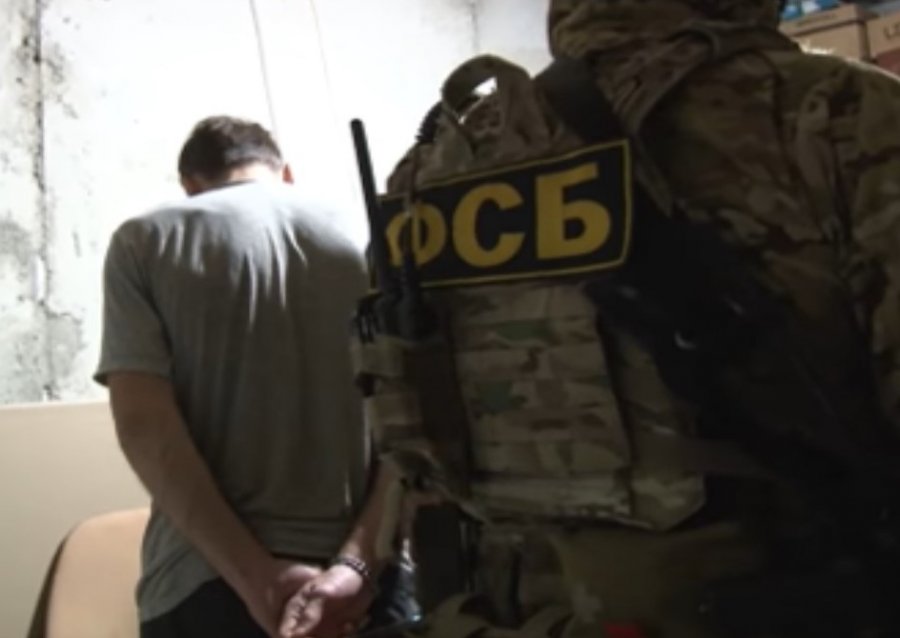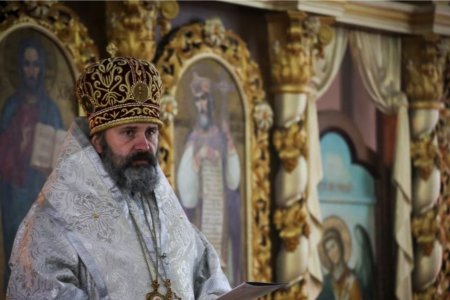
The Russian occupation regime in Crimea have closed an Islamic school in the Simferopol raion, claiming this to have been because of something termed the school’s ‘propaganda of Habashish’. The real reason here, as with the closure of multiple other Muslim organizations in occupied Crimea, is likely to have been the school’s religious independence from the occupation Spiritual Administration of Muslims of Crimea’ under ‘mufti’ Emirali Ablayev. The latter chose to collaborate with Moscow after Russia’s invasion, and has become a mouthpiece for the aggressor state, in exchange for power and, probably, help in crushing so-called ‘religious dissidence’. There are grounds for believing that Ablayev and his people have assisted Russia’s FSB in its persecution of Crimean Tatar and other Ukrainian Muslims. They have doubtless played a role in Russia’s systematic attack on the ‘Alushta’ Muslim community and illegal measures to deprive the community of the 19th Century Yukary Dzhami Mosque in the very centre of Alushta which had legally been in their hands since 1994. As well as administrative prosecutions against the Imam of this, and other Muslim communities on the surreal charge of ‘unlawful missionary activity’, Russia has passed horrific 18 and 19-year sentences against three members of the ‘Alushta’ community: Muslim Aliev; Lenur Khalilov and Ruslan Mesutov.
In commenting on the latest closure, the Presidential Mission in the Autonomous Republic of Crimea reported that of the 2,220 religious organizations existing in Crimea immediately prior to Russia’s invasion, only 932 remained at the beginning of January 2024. Some, for example, Hizb ut-Tahrir and the Jehovah’s Witnesses, were openly banned. In the case of the Jehovah’s Witnesses, over 30 believers have already faced extraordinary charges under Russia’s ‘extremism’ legislation, with many sentenced to six - seven years’ imprisonment. Persecution on charges of involvement in Hizb ut-Tahrir are somewhat different as Russia is using these prosecutions as a weapon against Crimean Tatar civic journalists and activists, as well as against Muslims who demonstrate religious independence. When the FSB, with the connivance of the prosecutor and ‘judges’, can use fake ‘expert assessments’ and ‘secret witnesses’, proof of actual involvement in Hizb ut-Tahrir is not required.
Other faiths, especially the Ukrainian Greek-Catholic Church and Evangelical communities have been effectively driven out of Crimea. As well as open threats and pressure, Russia illegally demanded that all religious organizations ‘re-register’ under Russian legislation. The requirements for this are much more onerous than under Ukrainian law, as well as more invasive, with religious communities asked, for example, about their attitude “to the government”. The other, and for many, the key obstacle lies in the fact that such re-registration is under Russian law and treats unlawfully unoccupied territory as though it were part of Russia.
Within a year of Russia’s invasion and annexation, essentially all faiths except the Russian Orthodox Church and, perhaps, those Muslim communities subordinate to the occupation Directorate under mufti Ablayev were under massive pressure in occupied Crimea, or had been hounded out.
The Orthodox Church of Ukraine has been systematically persecuted and deprived of its places of worship. As well as Russia’s aggressive efforts to destroy all that represents Ukrainian identity, the persecution was also linked with the first stand taken by the Church (then the Crimean Diocese of the Orthodox Church under the Kyiv Patriarchate) and Archbishop Klyment against Russia’s invasion and support for Ukraine (details here and here).
All of the same methods were applied in the Russian proxy ‘Donetsk and Luhansk people’s republics’, with some religious communities’ places of worship seized and the same ‘re-registration’ demanded, albeit to illegal ‘republics’ which Moscow fully controlled, yet had not yet formally ‘recognized’.
16 participants in the Prayer Marathon for Peace and Ukrainian Unity in occupied Donetsk were abducted and / or taken prisoner at various times, with five of them subjected to mock executions and, in some cases, to savage torture. World-renowned religious scholar Ihor Kozlovsky was held hostage for almost two years.
Russia has systematically crushed traditional Ukrainian religious freedom and diversity in occupied Crimea and Donbas, and is now adopting the same repressive measures on other Ukrainian territory that has fallen under its occupation. It is only a question of time before the invaders begin carrying out armed raids and arrests of Ukrainian Muslims, Jehovah’s Witnesses and others.
Other forms of terror began soon after the full-scale invasion of Ukraine. Two Greek-Catholic priests – Father Ivan Levytsky and Father Bohdan Heleta were abducted from their church in Berdiansk in November 2022. A week after their seizure, Russia admitted to their ‘arrest’ and claimed to have found weapons and ammunition in church premises. There was then silence for almost 18 months, until Kyiv managed to secure their release in the 28 June 2024 exchange of prisoners.
In February 2024, the Russians almost certainly killed 59-year-old Stepan Podolchak, a priest of the Orthodox Church of Ukraine and head of a church in occupied Kalanchak (Kherson oblast). Although the Russians tried to claim that Father Stepan had died “of a heart attack”, his body was found two days after the Russians abducted him from his home and took him away, barefooted, and with a bag over his head, having turned his home upside down. The invaders were, seemingly, trying to force Father Stepan to transfer his newly built church and its congregation, into the Orthodox Church under the Moscow Patriarch. Father Stepan had refused, insisting that he would not betray his oath nor his congregation.
In August 2024, Father Kostiantyn Maksymov, a Ukrainian Orthodox priest from occupied Tokmak (Zaporizhzhia oblast) was sentenced to 14 years on insane ‘spying’ charges. Russian reports assiduously avoided mentioning that he is a priest, although it was his religious status which, doubtless, led to his abduction and persecution. Although from a religious community that had historically been affiliated to Ukrainian Orthodox Church under the Moscow patriarchate, he had resisted attempts to forcibly merge the Berdiansk Diocese into the Russian Orthodox Church.
Other churches have also come under attack. Forum 18 reports, for example, that there have been three armed and masked raids on worship gatherings at a Council of Churches Baptist church in occupied Melitopol (Zaporizhzhia oblast). The pastor has been accused of ‘unlawful missionary activity’ for leading worship in his own church and has faced administrative charges.
There have been other such prosecutions for ‘unlawful missionary activities’ in at least occupied Luhansk oblast, In December 2022, Yevhen Balitsky, the Russian-installed ‘governor’ of occupied Zaporizhzhia oblast, banned four religious communities: the Ukrainian Greek-Catholic Church; the Grace Protestant Church; the Melitopol Chistian Church and the Word of Life Protestant Church. These were later claimed to be ‘sects’ which had taken part in organizing mass disorder and ‘anti-Russian activity’.
The occupying state has been insisting that all religious communities must ‘re-register’ under Russian legislation since 2023. This, like all Russia’s application of its legislation, is in flagrant violation of international law.




